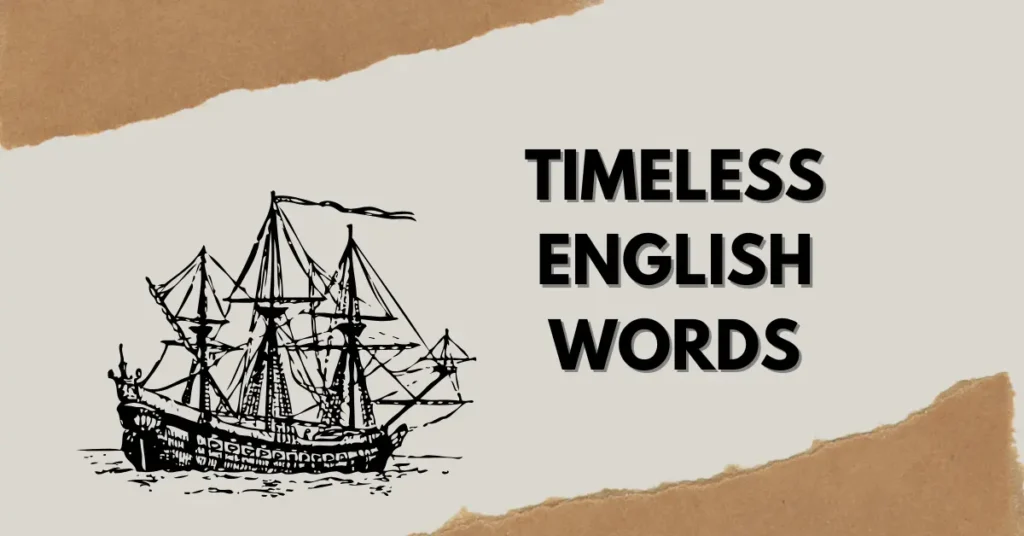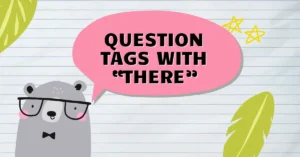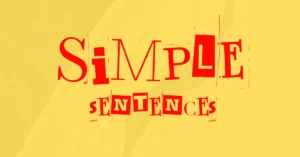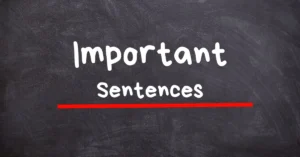The English language has evolved over centuries, absorbing words and influences from various cultures and languages. Among its many layers, Old English Words —spoken between the 5th and 11th centuries—forms the foundation of modern English. While much of this early vocabulary has been replaced or modified, several Old English words still linger, carrying with them a sense of history and charm.
These words, often rich in meaning and character, reflect the culture and lifestyle of an earlier era. By learning and understanding them, you can deepen your appreciation of the English language and add a unique flair to your vocabulary.

List of Timeless Words Old English Words
You’ll not only understand these words but also gain insight into their origins and how they can be woven into contemporary speech and writing. Embrace the beauty of Old English and discover how these timeless words can enrich your expression.
1. Fiend (noun)
Meaning: An evil spirit or demon; a wicked or cruel person.
Examples:
- The villain in the story was a fiend who delighted in causing misery.
- Some called him a fiend for his ruthless business practices.
2. Banshee (noun)
Meaning: A female spirit in Irish folklore whose wailing warns of an impending death in a family.
Examples:
- The eerie cry of the banshee sent shivers down their spines.
- Legends say that hearing a banshee foretells doom.
3. Nosiest (adjective)
Meaning: Being excessively curious about others’ affairs.
Examples:
- The nosiest neighbor always peered through the curtains.
- She accused him of being the nosiest person she had ever met.
4. Dray (noun)
Meaning: A low, strong cart without sides, used for carrying heavy loads.
Examples:
- The farmer loaded the barrels onto the dray.
- The dray was pulled by two sturdy horses.
5. Forlorn (adjective)
Meaning: Pitifully sad and abandoned or lonely.
Examples:
- He looked so forlorn sitting alone at the bus stop.
- The forlorn puppy whimpered in the rain.
6. Roughhewn (adjective)
Meaning: Not smoothly finished; crude or basic in form.
Examples:
- The roughhewn bench was sturdy but far from elegant.
- His ideas were roughhewn, needing refinement.
7. Quiver (verb/noun)
Meaning (verb): To tremble or shake.
Meaning (noun): A container for holding arrows.
Examples:
- (Verb) She began to quiver with fear as the thunder roared.
- (Noun) He reached into his quiver and drew an arrow.
8. Besmirch (verb)
Meaning: To damage the reputation of someone or something; to make dirty.
Examples:
- They tried to besmirch his good name with lies.
- The scandal threatened to besmirch the company’s reputation.
9. Brabble (verb)
Meaning: To argue loudly and noisily.
Examples:
- The siblings began to brabble over the last slice of cake.
- It’s not worth the time to brabble over minor details.
10. Expergefactor (noun)
Meaning: Something that wakes you up, like an alarm or a sudden noise.
Examples:
- The rooster acted as their natural expergefactor every morning.
- Her alarm clock is the most annoying expergefactor imaginable.
11. Earthenware (noun)
Meaning: Pottery made of baked or hardened clay.
Examples:
- The museum displayed ancient earthenware from the Bronze Age.
- She served the stew in beautiful earthenware bowls.
12. Swain (noun)
Meaning: A young lover or country boy.
Examples:
- The romantic ballad told of a fair maiden and her swain.
- The swain serenaded her under the moonlight.
13. Trumpery (noun)
Meaning: Worthless nonsense; cheap or showy ornamentation.
Examples:
- The market was filled with trumpery, flashy but of no real value.
- He dismissed the rumors as mere trumpery.
14. Pannikin (noun)
Meaning: A small metal cup or pan.
Examples:
- He poured his coffee into a battered pannikin.
- The traveler carried a pannikin for drinking water during his journey.
15. Nether (adjective)
Meaning: Situated down or below; lower.
Examples:
- The cave’s nether regions were dark and mysterious.
- They descended into the nether depths of the valley.
16. Liverish (adjective)
Meaning: Irritable or peevish, often due to poor digestion or health.
Examples:
- He felt liverish after eating too much greasy food.
- Her liverish mood made her snap at everyone.
17. Mizzen (noun)
Meaning: A sail or mast on a ship, typically the one nearest the stern.
Examples:
- The mizzen was torn during the storm.
- He climbed the mizzen mast to adjust the rigging.
18. Bequeath (verb)
Meaning: To leave something to someone in a will.
Examples:
- She decided to bequeath her jewelry to her granddaughter.
- The philanthropist bequeathed his fortune to charity.
19. Snottor (adjective, Old English)**
Meaning: Wise or prudent.
Examples:
- The elder was known for his snottor advice to the villagers.
- He approached the problem with a snottor and thoughtful plan.
20. Salve (noun/verb)
Meaning (noun): A soothing ointment for healing the skin.
Meaning (verb): To soothe or comfort.
Examples:
- (Noun) The nurse applied a salve to the burn.
- (Verb) Her kind words helped salve his wounded pride.
21. Gnat (noun)
Meaning: A small, flying insect, often annoying.
Examples:
- A gnat buzzed around her head as she tried to sleep.
- Swarms of gnats made the hike through the swamp unbearable.
22. Earwig (noun)
Meaning: A small insect with pincers on its tail; also, to secretly influence someone.
Examples:
- An earwig crawled out from under the log.
- The advisor tried to earwig the king into agreeing with his plans.
23. Heir (noun)
Meaning: A person legally entitled to inherit property or a title.
Examples:
- The duke’s only heir was his young daughter.
- She was named the sole heir to her uncle’s fortune.
24. Betroth (verb)
Meaning: To formally engage someone to marry.
Examples:
- He announced his intention to betroth his daughter to the prince.
- They were betrothed in a quiet family ceremony.
25. Piddock (noun)
Meaning: A type of burrowing mollusk.
Examples:
- The piddock burrows into rocks to create its home.
- She found a piddock shell while walking along the beach.
26. Loam (noun)
Meaning: A type of fertile soil made of sand, silt, and clay.
Examples:
- The gardener used loam to enrich the flowerbeds.
- Plants thrive in loam because of its perfect balance of nutrients.
27. Beowulf (noun)
Meaning: A hero of an Old English epic poem; symbolic of strength and bravery.
Examples:
- The warrior fought with the courage of Beowulf.
- Students analyzed the story of Beowulf in their literature class.
28. Hum Durgeon (noun)**
Meaning: An imaginary illness or unfounded complaint.
Examples:
- Stop complaining about every little thing; it’s just a hum durgeon.
- His constant hum durgeon annoyed everyone around him.
29. Furlong (noun)
Meaning: A unit of distance equal to 220 yards.
Examples:
- The farm stretched a full furlong in length.
- He ran a furlong before stopping to catch his breath.
30. Learned (adjective)
Meaning: Having much knowledge acquired through study.
Examples:
- The learned professor shared his insights on history.
- She became learned in the art of embroidery after years of practice.
31. Wizened (adjective)
Meaning: Shrunken and wrinkled due to age.
Examples:
- The wizened old man sat by the fire, telling stories of his youth.
- A wizened apple lay forgotten at the bottom of the basket.
32. Soothsayer (noun)
Meaning: A person who predicts the future.
Examples:
- The soothsayer warned the king of impending danger.
- Many villagers sought advice from the local soothsayer.
33. Wiccan (noun/adjective)
Meaning (noun): A practitioner of modern pagan witchcraft.
Meaning (adjective): Related to Wicca or its practices.
Examples:
- (Noun) She identifies as a Wiccan and practices nature-based rituals.
- (Adjective) The Wiccan festival celebrates the cycles of the moon.
34. Grubble (verb)
Meaning: To grope or feel around with your hands in search of something.
Examples:
- He had to grubble in the dark to find his lost keys.
- She began to grubble through her bag for her phone.
35. Icicle (noun)
Meaning: A hanging piece of ice formed by dripping water freezing.
Examples:
- The roof was lined with sharp icicles after the snowstorm.
- She accidentally broke an icicle while closing the window.
36. Whirlpool (noun)
Meaning: A powerful circular current of water.
Examples:
- The canoe was nearly pulled into the whirlpool.
- He watched as the leaves spun around in a small whirlpool in the river.
37. Slaughter (noun/verb)
Meaning (noun): The killing of animals for food or in a brutal manner.
Meaning (verb): To kill animals or people in large numbers or with cruelty.
Examples:
- (Noun) The slaughter of innocent civilians shocked the nation.
- (Verb) They planned to slaughter the sheep for the feast.
38. Thither (adverb)
Meaning: To or toward that place.
Examples:
- She journeyed thither in search of peace.
- The knight rode thither, following the distant sound of a trumpet.
39. Dogged (adjective)
Meaning: Persistent; showing tenacity and determination.
Examples:
- His dogged efforts finally earned him a promotion.
- She pursued her dreams with dogged determination.
40. Fathom (verb/noun)
Meaning (verb): To understand after much thought.
Meaning (noun): A unit of depth equal to six feet, used in nautical contexts.
Examples:
- (Verb) I can’t fathom why he would make such a decision.
- (Noun) The ship sank to a depth of ten fathoms.
41. Manhandle (verb)
Meaning: To handle someone or something roughly.
Examples:
- The security guards had to manhandle the unruly guest out of the venue.
- He had to manhandle the heavy couch up the stairs.
42. Sallow (adjective)
Meaning: Of a sickly, yellowish color.
Examples:
- Her sallow complexion worried the doctor.
- The dim light gave his face a sallow appearance.
43. Jargogle (verb)**
Meaning: To confuse or jumble something.
Examples:
- The instructions were so complicated they completely jargogled me.
- Don’t jargogle the wires, or the machine won’t work.
44. Errand (noun)
Meaning: A short journey undertaken to deliver or collect something.
Examples:
- He went on an errand to fetch groceries from the store.
- She asked her son to run a quick errand for her.
45. Pinafore (noun)
Meaning: A sleeveless garment worn over a dress, often as an apron.
Examples:
- The little girl wore a pinafore over her Sunday dress.
- She tied on a pinafore to protect her clothes while cooking.
46. Zwodder (noun)**
Meaning: A state of drowsiness or confusion.
Examples:
- After staying up all night, he was in a zwodder all morning.
- The hot weather left them in a sleepy zwodder by the afternoon.
47. Bedight (verb)**
Meaning: To decorate or adorn.
Examples:
- The room was bedight with flowers and ribbons for the celebration.
- Her gown was bedight with sparkling jewels.
48. Fudgel (verb)
Meaning: To pretend to work while actually doing nothing.
Examples:
- He spent the afternoon fudgeling at his desk instead of completing his tasks.
- Stop fudgeling and start being productive!
49. Hundredth (adjective/noun)
Meaning: The ordinal number equivalent to the number 100.
Examples:
- This year marks the hundredth anniversary of the school’s founding.
- She was the hundredth person to sign the petition.
50. Bower (noun)
Meaning: A pleasant, shady place under trees or climbing plants.
Examples:
- They sat together in the bower, enjoying the cool shade.
- The garden’s bower was a favorite spot for reading.
51. Kipper (noun)
Meaning: A fish, especially a herring, that has been cured by splitting, salting, and smoking.
Examples:
- He enjoyed a traditional breakfast of kippers and eggs.
- The smoky aroma of kippers filled the kitchen.
52. Kirtle (noun)
Meaning: A long gown or dress worn by women in the Middle Ages.
Examples:
- She wore a green kirtle embroidered with gold thread.
- The museum displayed an authentic kirtle from the 14th century.
53. Tithe (noun/verb)
Meaning (noun): One-tenth of something, often a contribution to a church.
Meaning (verb): To give one-tenth of income or produce, especially for religious purposes.
Examples:
- (Noun) The farmer gave a tithe of his harvest to the local church.
- (Verb) They decided to tithe a portion of their earnings to charity.
54. Dreary (adjective)
Meaning: Dull, bleak, and depressing.
Examples:
- The rainy weather created a dreary atmosphere.
- His speech was so dreary that half the audience fell asleep.
55. Snollygoster (noun)
Meaning: A shrewd, unprincipled person, especially in politics.
Examples:
- Many accused the corrupt mayor of being a snollygoster.
- Don’t trust that snollygoster—he only cares about himself.
56. Hassock (noun)
Meaning: A thick, firm cushion used as a footstool or for kneeling.
Examples:
- She rested her feet on a soft hassock after a long day.
- The priest knelt on a hassock during the prayer.
57. Reckless (adjective)
Meaning: Acting without thinking or caring about the consequences.
Examples:
- His reckless driving nearly caused an accident.
- She made a reckless decision to quit her job without a backup plan.
58. Aspen (noun)
Meaning: A type of tree with leaves that tremble in the wind.
Examples:
- The aspen trees shimmered in the breeze.
- They built their cabin near a grove of aspens.
59. Forswear (verb)
Meaning: To renounce or reject something under oath.
Examples:
- He vowed to forswear his past mistakes and start anew.
- She decided to forswear unhealthy habits and focus on her health.
60. Abide (verb)
Meaning: To accept or act in accordance with a rule or decision; to remain or stay.
Examples:
- You must abide by the rules of the game.
- He promised to abide in the village until the harvest was complete.
61. Bushel (noun)
Meaning: A measure of capacity equal to 8 gallons, used for dry goods.
Examples:
- They harvested over a bushel of apples from the orchard.
- The farmer sold his produce by the bushel at the market.
62. Linseed (noun)
Meaning: The seeds of the flax plant, often used to produce oil.
Examples:
- She added linseed to her morning smoothie for extra nutrients.
- Linseed oil is commonly used as a wood finish.
63. Creepy (adjective)
Meaning: Causing an unpleasant feeling of fear or unease.
Examples:
- The abandoned house had a creepy vibe.
- A creepy shadow passed by the window, startling her.
64. Erstwhile (adjective)
Meaning: Former or previous.
Examples:
- Her erstwhile friends no longer spoke to her.
- The erstwhile king now lived in exile.
65. Hither (adverb)
Meaning: To this place; here.
Examples:
- Come hither, and I will tell you a story.
- The traveler was called hither by the sound of the river.
66. Withy (noun/adjective)
Meaning (noun): A flexible twig or branch, typically from a willow tree.
Meaning (adjective): Flexible or pliable.
Examples:
- (Noun) She wove the basket using withy branches.
- (Adjective) The withy stems bent easily without breaking.
67. Wanton (adjective)
Meaning: Deliberate and unprovoked; reckless or immoral.
Examples:
- The vandals caused wanton destruction in the park.
- Her wanton disregard for the rules got her into trouble.
68. Hurdle (noun/verb)
Meaning (noun): An obstacle or difficulty.
Meaning (verb): To jump over something.
Examples:
- (Noun) They faced several hurdles while trying to start their business.
- (Verb) The athlete managed to hurdle the fence with ease.
69. Goatee (noun)
Meaning: A small, pointed beard on a man’s chin.
Examples:
- He trimmed his goatee to keep it neat.
- The villain in the movie had a sinister-looking goatee.
70. Plenty (noun/adjective/adverb)
Meaning: A large or sufficient amount.
Examples:
- (Noun) There was plenty of food for everyone at the feast.
- (Adverb) The room was plenty big enough for the guests.
71. Touchstone (noun)
Meaning: A standard or criterion by which something is judged.
Examples:
- Honesty is the touchstone of a good relationship.
- This film became the touchstone for modern science fiction.
72. Fiery (adjective)
Meaning: Consisting of or resembling fire; passionate or intense.
Examples:
- His fiery temper often got him into trouble.
- The sunset painted the sky in fiery shades of orange and red.
73. Billingsgate (noun)
Meaning: Coarse or vulgar language.
Examples:
- The sailor’s billingsgate shocked everyone at the party.
- They were warned not to use billingsgate during the formal dinner.
74. Bookkeeping (noun)
Meaning: The activity of keeping financial records.
Examples:
- She learned bookkeeping to manage her small business accounts.
- Accurate bookkeeping is essential for tax purposes.
75. Dross (noun)
Meaning: Waste or impurities; something considered worthless.
Examples:
- The novel was filled with so much dross that it was hard to enjoy.
- They skimmed the dross off the molten metal during the refining process.
76. Scaup (noun)
Meaning: A type of diving duck.
Examples:
- We spotted a scaup swimming near the lake’s edge.
- The flock of scaups flew in perfect formation.
77. Brine (noun)
Meaning: Saltwater, often used for preserving food.
Examples:
- The pickles were stored in a jar of brine.
- The fisherman soaked the fish in brine before cooking.
78. Stringy (adjective)
Meaning: Containing or resembling strings; fibrous or tough.
Examples:
- The meat was overcooked and became stringy.
- The cheese melted into a stringy mess.
79. Fennel (noun)
Meaning: A flowering plant with feathery leaves, used as a herb or spice.
Examples:
- She added fresh fennel to the salad for extra flavor.
- The dish was garnished with a sprig of fennel.
80. Nightingale (noun)
Meaning: A small bird known for its beautiful, melodious song.
Examples:
- The nightingale sang sweetly in the moonlight.
- Poets often write about the enchanting song of the nightingale.
81. Nestle (verb)
Meaning: To settle snugly or comfortably.
Examples:
- The cottage was nestled in the heart of the forest.
- She nestled into the blanket, enjoying the warmth.
- Definition of Question Tags with “There” + How to Use
 Question Tags with ‘There” Ever wondered how to turn those sentences with “there” into polite, …
Question Tags with ‘There” Ever wondered how to turn those sentences with “there” into polite, … - Do not Get Into Something Meaning + Example Sentences
 Have you ever found yourself in a situation that spiraled out of control because you …
Have you ever found yourself in a situation that spiraled out of control because you … - 71 Simple Sentence Examples
 Simple sentence examples! If you’re a beginner or looking to sharpen your English, these examples …
Simple sentence examples! If you’re a beginner or looking to sharpen your English, these examples … - 43 Short but Important Sentences for Daily Use
 Important sentences: Ever got stuck searching for the perfect words to say? Don’t worry! Life’s …
Important sentences: Ever got stuck searching for the perfect words to say? Don’t worry! Life’s … - 101 Other Ways to Say “I Love You”
 This lesson is going to be unforgettable this will add a touch of romance to …
This lesson is going to be unforgettable this will add a touch of romance to …




